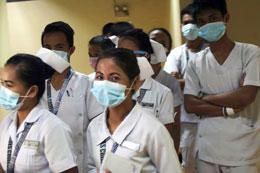Insurance hikes to reform Philippine health care system

Overseas Filipino Workers (OFWs) will be hit hard as mandatory health insurance premiums for every expat Filipino worker — including domestic helpers — is set to spike by 186 percent from 2019.
For a housemaid earning $400 a month, it will hit $242 per year by 2024, according a new law dubbed as a "new dawn" for healthcare in the Asian country.
On February 20, 2019, the Universal Health Care (UHC) Bill was signed into law (Republic Act No. 11223) by President Rodrigo Duterte. It automatically lists all Filipino citizens in the National Health Insurance Programme (NHIP).
The law prescribes certain reforms to bring world-class healthcare for all and incentivize Filipino health workers to stay back home, instead of leaving for better-paying jobs abroad.
In effect, it embodies a cross-subsidy principle — where the rich and the state pay for what is envisioned as quality healthcare for all, said Gulf News in a special report.
In theory, this is revolutionary: All Filipinos are automatically included in the NHIP. It also guarantees immediate eligibility to program benefits.
Moreover, the new law gives citizen-members access to the "full continuum" of needed health services and protects them from financial ruin when they fall ill. The law also mandates PhilHealth to come up with a comprehensive outpatient package — which includes outpatient drugs within two years after its enactment.
Section 10 of RA 11223 prescribes the percentages of monthly premiums based on income.
In reality, as revealed by the Business Mirror, $242 premium per year could be a steep price to pay for Filipino housemaids overseas, whose government-prescribed minimum pay is $400 (about Php20,000) a month.
Currently, the fixed rate for premiums for PhilHealth for every OFW is Php2,400 ($47) across the board. Implementing rules and regulations (IRR) of the law are currently being drafted, which embodies a progressively higher PhilHealth premium.
This 2019, individual PhilHealth premiums would be raised by a whopping 186 percent spike from the current rate, according to Business Mirror. By next year (2020), the annual premium will further rise to Php7,488.
By 2024, monthly contributions of an OFW domestic worker to PhilHealth would be set at Php1,040 or Php12,480 ($242) per year at the minimum, under the proposed rules.
An OFW who earns about $1,000 monthly (Php50,000) would have to pay PhilHealth premiums of Php16,500 when the new rates kick in.
It was not immediately clear if or when the IRR prescribing the new rates would be adopted.
A vacationing OFW gets free medical treatment as a mandatory PhilHealth member. But there's a caveat: free medical treatment can be availed of, provided but he or she would pay all missed contributions with interest, compounded monthly.
PhilHealth (under the Department of Health, DOH), as a state-owned health insurance corporation, plays a critical role in ensuring that the provisions of this law are fulfilled.
The agency has been saddled with charges of corruption that has already seen its top executives getting axed.
The PhilHealth Board of Directors faced the wrath of some OFWs after failure to resolve cases of those who claimed to have paid premiums to PhilHealth only to find out during desperate times that their premiums were pilfered and receipts were forged.
The investigation of such cases had been left with Philippine Overseas Employment Administration, though criminal liability is seen involving of liaison officers of recruitment agencies that may be in cahoots with PhilHealth insiders.
Who funds PhilHealth?
• Total incremental sin tax collections as provided under Republic Act 10351 otherwise known as the “Sin Tax Reform Law”;
• 50 percent of the national government share from the income of the Philippine Amusement Gaming Corp.;
• 40 percent of the Charity Fund, net of Documentary Stamp Tax Payments, and mandatory contributions of the Philippine Charity Sweepstakes Office;
• Premium contributions of members;
• Annual appropriations of the DOH as included in the General Appropriations Act; and,
• National government subsidy to PhilHealth included in the General Appropriations Act.






